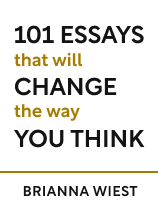

This article is an excerpt from the Shortform book guide to "101 Essays That Will Change the Way You Think" by Brianna Wiest. Shortform has the world's best summaries and analyses of books you should be reading.
Like this article? Sign up for a free trial here .
Why is it important to challenge your beliefs? How do you know whether your beliefs and opinions about the world are true? What are the consequences of living with blind beliefs?
Challenging your beliefs is an important step in self-growth. The more you question the validity of your thoughts and beliefs, the less likely you are to accept other people’s opinions as your own.
The following questions will help you question your beliefs to see whether they align with who you really are.
Assess Your Current Opinions and Beliefs
An important step in learning to think for yourself is assessing whether your current opinions and beliefs align with who you really are, or if they only exist to please or impress others. She suggests that you can dissect each of your opinions and beliefs by asking yourself the following four questions:
- When was the first time you came across this idea? For example, you believe that people should not make mistakes. You remember overhearing your parents punishing one of your siblings for making errors on a spelling test.
- How does this idea influence your judgment of yourself, other people, and your experiences? Your belief that people should not make mistakes compels you to be overly critical of yourself and others. It also makes you feel resentful of the experiences that don’t live up to your perfect standards.
- How might adopting opposing ideas impact you? If instead, you choose to believe that it’s okay to make mistakes, you might find it easier to accept and forgive yourself and others for making mistakes. You might also be less inclined to notice mistakes in the first place.
- How would you choose to think about this if your thoughts were already aligned with who you really are? Your aligned self sees mistakes as a valuable part of learning. Therefore, there’s no need to feel critical of yourself or others for making mistakes.
Use CBT to Challenge Your Opinions and Beliefs
The CBT method provides more specific questions to help you challenge your beliefs by objectively examining them from multiple perspectives. Therefore, you’ll gain a deeper understanding of your beliefs if you answer the following questions in addition to Wiest’s four questions.
Facts
- What evidence is there to support your thoughts about this?
- What evidence disproves or contradicts your thoughts about this?
- Are your opinions getting in the way of the facts?
- Are there any facts that you’ve ignored or overlooked?
Other explanations
- Can you think about this differently?
- Is your mood impacting the way you’re thinking about this?
- Have you ever felt differently about this?
- Are you likely to change your opinion about this over time?
Your feelings
- How does believing in this idea make you feel good?
- How does believing in this idea make you feel bad?
- How will you feel if you continue to hold onto this belief?

———End of Preview———
Like what you just read? Read the rest of the world's best book summary and analysis of Brianna Wiest's "101 Essays That Will Change the Way You Think" at Shortform .
Here's what you'll find in our full 101 Essays That Will Change the Way You Think summary :
- Why the only way to make yourself feel better is to change the way you think
- How social conditioning influences the way you unconsciously think
- How to manage your thoughts and feelings about yourself and your experiences






